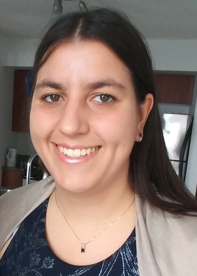Awards and recognition
Ashina Nagra and Cindy Shaheen awarded 2021 Zymeworks Fellowship in Immunotherapeutics
We extend our congratulations to 2021 Zymeworks Fellowship in Immunotherapeutics recipients Ashina Nagra and Cindy Shaheen, both PhD candidates at the University of British Columbia (UBC). Created partly in recognition of the Nobel laureate Dr. Michael Smith, this is the most prestigious internal award offered to graduate students of UBC’s Department of Microbiology and Immunology and the Michael Smith Laboratories. With the generous support of Zymeworks Inc., we are pleased to announce the awarding of two $20,000 fellowships, which directly support thesis research focused on relevant aspects of discovery and development of biologic therapeutics.
“We are pleased to partner with the University of British Columbia in funding the Zymeworks Fellowship in Immunotherapeutics and are impressed by the scope of the research being conducted by the two current recipients,” said Ali Tehrani, Ph.D., Zymeworks President and CEO. “At Zymeworks, a clinical-stage biopharmaceutical company developing multifunctional biotherapeutics, we are enthusiastic about research that will advance understanding of chronic inflammatory diseases, as well as research that demonstrates how certain molecules behave inside living cells.”
 Fellowship award recipient Ashina Nagra (she/her) is a member of the Harder lab in the Department of Microbiology and Immunology. The Harder Lab has a long-standing interest in understanding the developmental programs guiding monocyte, macrophage, neutrophil and dendritic cell production from hematopoietic stem and progenitor cells. The research conducted serves to better our understanding of chronic inflammatory diseases such as cancer, inflammatory bowel disease, heart disease, obesity, aging, and neurodegeneration, as recent studies from the lab have shown that phagocytes play key roles in each of these diseases.
Fellowship award recipient Ashina Nagra (she/her) is a member of the Harder lab in the Department of Microbiology and Immunology. The Harder Lab has a long-standing interest in understanding the developmental programs guiding monocyte, macrophage, neutrophil and dendritic cell production from hematopoietic stem and progenitor cells. The research conducted serves to better our understanding of chronic inflammatory diseases such as cancer, inflammatory bowel disease, heart disease, obesity, aging, and neurodegeneration, as recent studies from the lab have shown that phagocytes play key roles in each of these diseases.
Nagra’s research focus is advancing our understanding of mononuclear phagocytes (cells derived from precursor cells in the bone marrow). Monocytes are one such immune cell type classified as mononuclear phagocytes. Nagra hopes to characterize the signalling pathways regulating nonclassical monocyte development and render this into new and improved immunotherapies for curbing tumour metastasis.
Receiving an award like this early in her career, Nagra reflects, “The Zymeworks Fellowship in Immunotherapeutics has given me the resources to begin my PhD with a bang, as I can begin making early contributions to my research field in Immunology. It is wonderful to know people support my educational dreams. I feel empowered to keep working hard so that I can use my scientific training to make a difference in my community.”
 A member of the Leslie lab at the Michael Smith Laboratories, Cindy Shaheen’s (she/her) work focuses on single molecule imaging that bridges the gap between in vitro and live cells experiments. There are different variables within these two environments: inside a test tube and inside a cell, which can alter the outcome of experiments. The lab’s single-molecule technology, Convex Lens-induced Confinement (CLiC), uses UV lithography to etch microscopic “pits” on glass plates that can be used to trap molecules and observe their behaviours in “cell-like” conditions. Crowding agents (large molecules mimicking the crowded space inside a cell) can be added to the trapped molecules in order to observe how their structure changes.
A member of the Leslie lab at the Michael Smith Laboratories, Cindy Shaheen’s (she/her) work focuses on single molecule imaging that bridges the gap between in vitro and live cells experiments. There are different variables within these two environments: inside a test tube and inside a cell, which can alter the outcome of experiments. The lab’s single-molecule technology, Convex Lens-induced Confinement (CLiC), uses UV lithography to etch microscopic “pits” on glass plates that can be used to trap molecules and observe their behaviours in “cell-like” conditions. Crowding agents (large molecules mimicking the crowded space inside a cell) can be added to the trapped molecules in order to observe how their structure changes.
“When we are studying things only in vitro, we could be missing important differences in terms of how molecules behave inside cells, which are much more complicated environments,” Shaheen explains.
“This work is important because for various applications, like drug development technologies, you’re going to start off with thousands of molecules inside of a test tube trying to find the best candidates. Once you’ve identified those, you will place those molecules into cells and they might not behave the same as they did in the test tube. So, we’re missing a step in between where we can screen these thousands of molecules in a way that is more representative of how they might behave in the cell.”
The goal of the Leslie lab’s research is to improve therapeutics on a large scale. Understanding the behaviour of DNA in this way could assist in fast tracking drug development. Being able to isolate specific molecules and test their effectiveness for possible treatments will reduce the trial-and-error methods currently used.
“Receiving this funding allows me to focus on this more basic research and pursue the ambitious goal of bridging that gap between ‘cell-like’ and ‘on-a-chip’ conditions.”
The funding for both Nagra and Shaheen at this important stage in their careers will help propel the work their labs are doing to further biologic therapeutic development. We are excited to see where the potentially far-reaching impacts of their research will take them.